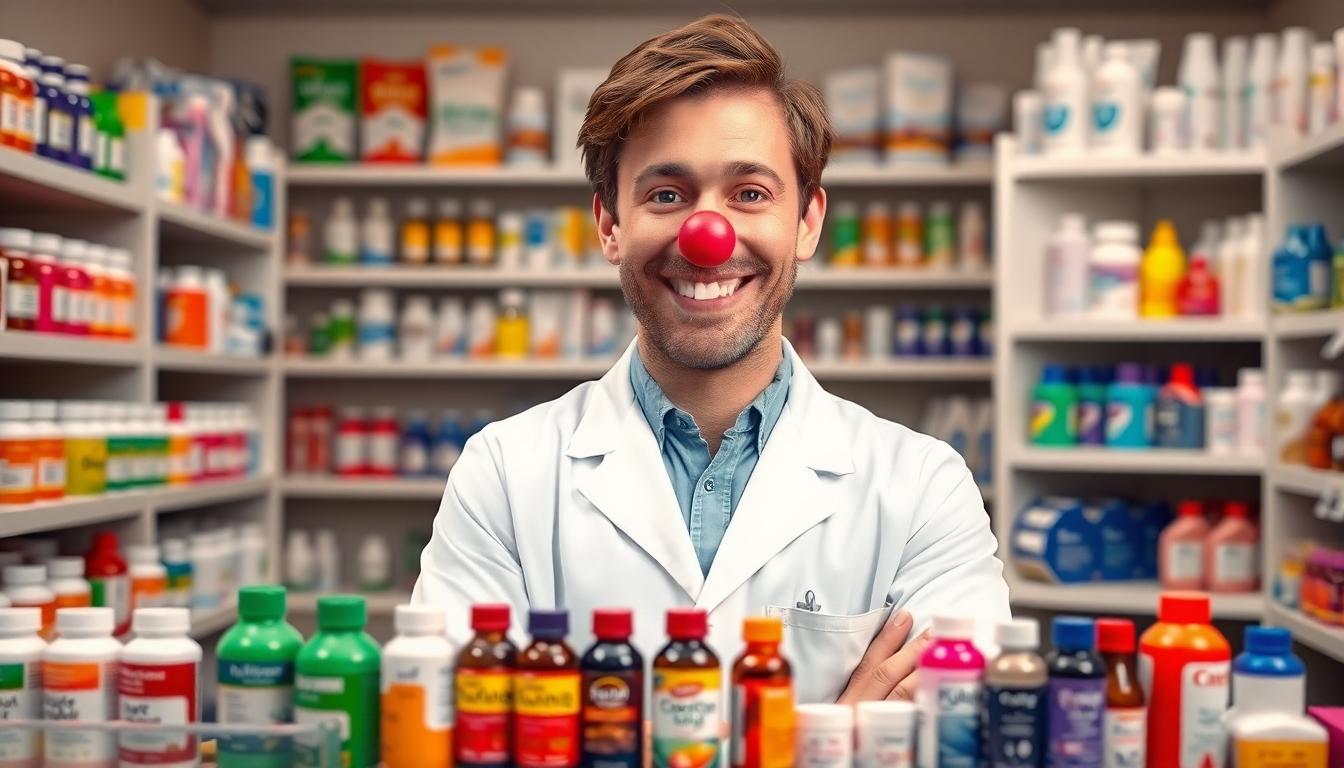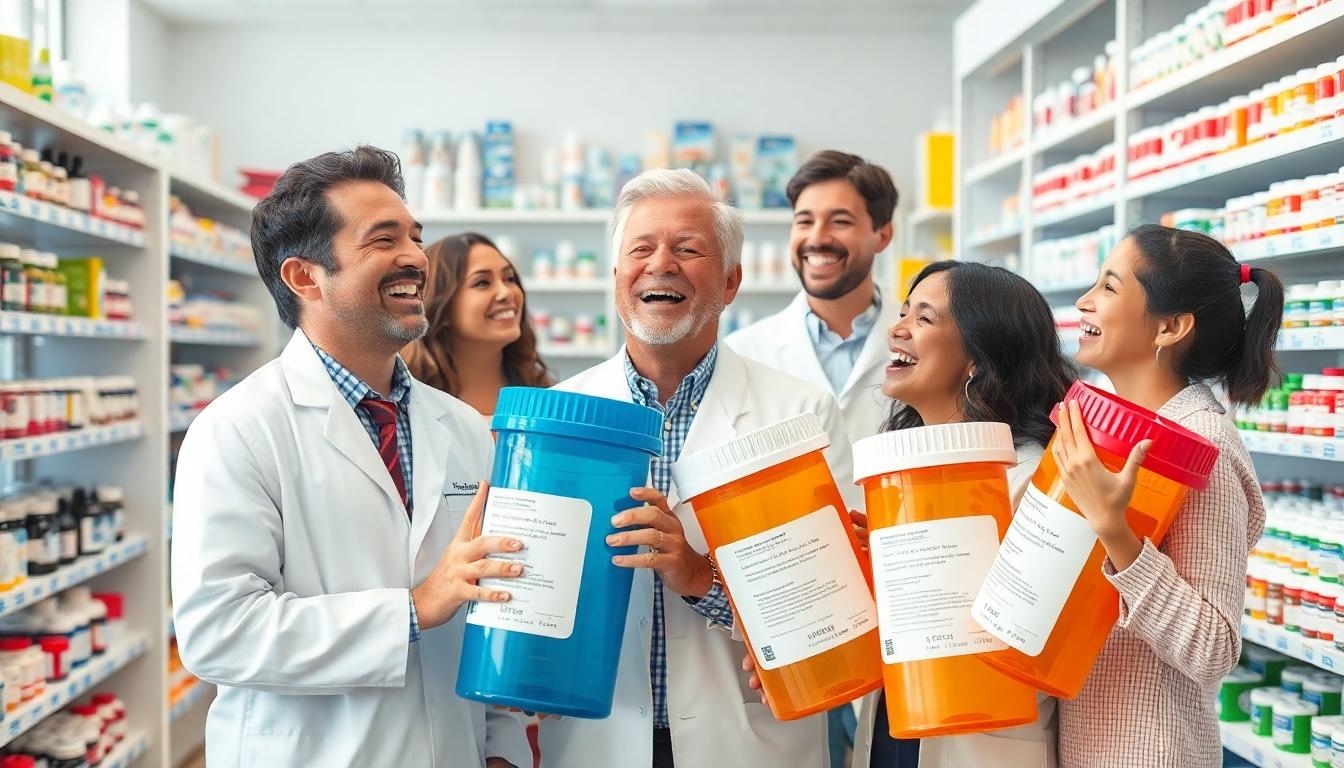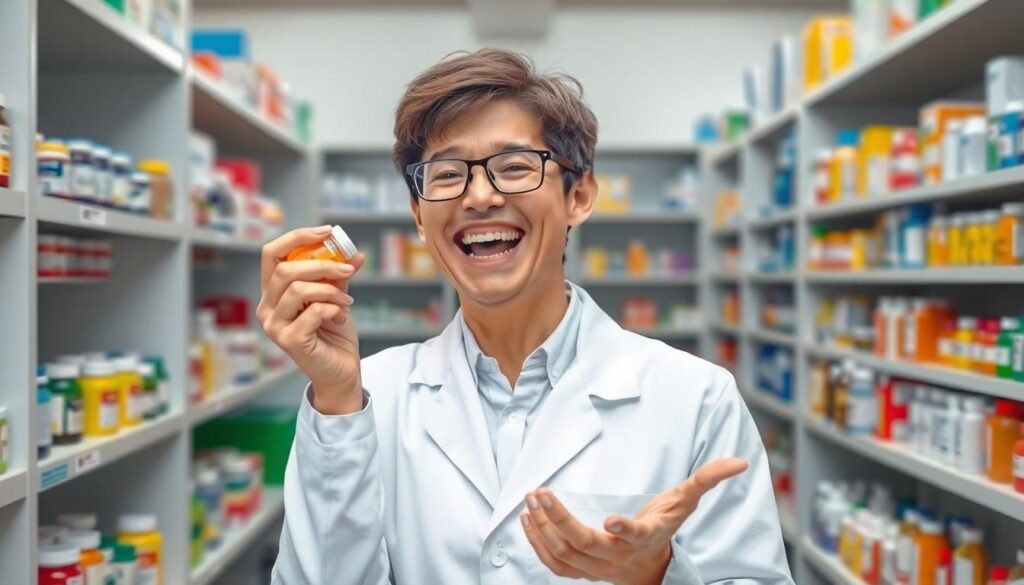Laughter is often the best medicine, and when it comes to pharmacy jokes, we’ve got a prescription for fun that’s guaranteed to cure your boredom. From puns about pills to humorous takes on prescriptions, pharmacy humor offers a unique way to lighten the mood in an otherwise serious healthcare setting.
10 Prescription-Strength Pharmacy Jokes to Brighten Your Day
- The Counting Pills Conundrum: A pharmacist counted 30 pills for a prescription but accidentally dropped one on the floor. Instead of picking it up, they told the patient, “Take one every day for a month except on the 31st.” We’ve heard this happens more often than pharmacists would like to admit!
- The Refill Request: Patient asks, “Can I get a refill on my prescription?” Pharmacist replies, “I don’t know, can you pay for it?” Money might not buy happiness, but it certainly buys medicine.
- The Side Effect Warning: Pharmacist says to patient, “This medication may cause drowsiness, so don’t operate heavy machinery.” Patient responds, “That’s fine, I don’t even know how to use the microwave.” Seems like the warning wasn’t necessary after all!
- The Generic Question: Customer asks, “What’s the difference between the brand name and generic version?” Pharmacist answers, “About $50.” Truth in pricing has never been so clear.
- The Pronunciation Problem: Doctor writes a prescription for a medication with 15 syllables. Pharmacist asks patient, “Did your doctor tell you how to pronounce this?” Patient says, “No, he just wrote it down and giggled.” Some drug names require a linguistics degree to pronounce properly.
- The Insurance Explanation: Pharmacist tells patient, “Your insurance won’t cover this.” Patient responds, “That’s fine, I’ll just die instead.” Dark humor is like medicine – not everyone gets it.
- The Vitamin Inquiry: Customer asks, “Where are your vitamins?” Pharmacist points to fruits and vegetables section and says, “Nature made them first.” Sometimes the best medicine grows on trees or in the ground.
- The Antibiotic Request: Patient demands, “I need antibiotics for my cold.” Pharmacist replies, “You need chicken soup and patience.” Fighting viruses with antibiotics is like trying to put out a fire with gasoline.
- The Drug Interaction: Pharmacist asks, “Are you taking any other medications?” Patient answers, “Just whatever I find in my medicine cabinet that looks interesting.” Mixing random medications creates exciting new side effects not approved by the FDA.
- The Memory Medication: Patient complains, “I think I forgot to take my memory medication.” Pharmacist responds, “You’ve picked it up three times today.” Memory issues are no joke, except when they actually are.
The Best Medicine: Why Humor Belongs in Every Pharmacy

Humor in pharmacy isn’t just about getting a laugh—it serves critical dual purposes of reducing stress for healthcare professionals and improving patient relationships. Pharmacy professionals often experience high stress levels, with mental health quality-of-life metrics falling below national norms.
The Therapeutic Benefits of Laughter
Laughter activates powerful immune responses in the body, significantly increasing natural killer cell activity and immunoglobulins. Studies have demonstrated that when patients watch humor videos, their immune markers show measurable improvement. The physiological benefits extend beyond immune function, as shared laughter between providers and patients creates an environment of trust and easier communication. This transition helps conversations flow naturally from clinical topics to more personal connections. We should note that humor must always be patient-led to avoid potential insensitivity, particularly when working with diverse populations protected under civil rights legislation.
Building Rapport with Patients Through Humor
Compassionate humor creates approachability and emotional connections in patient interactions, as exemplified by Elizabeth O’Hara’s effective use of clown noses in healthcare settings. Pharmacists can adopt similar approaches by tailoring their humor to individual patient preferences. Asking simple questions like “What made you laugh recently?” helps gauge a patient’s comfort level with humor and establishes common ground. Research emphasizes the importance of avoiding negative humor forms such as sarcasm, which can perpetuate harmful dynamics in care settings. When implementing humor in pharmacy practice, we must consider three key factors: appropriateness (avoiding humor targeting protected demographics), consent (securing colleague approval before involving peers), and patient-centricity (following the patient’s lead to ensure their comfort).
Pill-ariously Funny: Classic Pharmacy One-Liners

Pharmacy humor has a special way of making us smile with clever wordplay and medical puns. These one-liners capture the lighter side of healthcare while showcasing the wit that flows freely behind the pharmacy counter.
- Love is like asthma; it takes your breath away
- A dose of humor a day keeps the doctor away
- I can’t aspirin for a better day
- Feeling unwell? Vitamin see the funny side
- Don’t be acetaminophen, just laugh
Customer Counter Classics
Pharmacy jokes often bloom at the counter where pharmacists and customers interact daily. These humorous exchanges have become legendary in pharmaceutical circles:
- A man walks into a pharmacy, buys a condom, then walks out of the store laughing hysterically. The pharmacist thinks this is weird.
- Why did the pharmacist always win at Monopoly? They had “prescription strategies”.
- That was syrup-ly hilarious.
Prescription Label Laughs
- Take two laughs and call me in the morning
- Your prescription: Two giggles and call me in the morning
- I tried to make a pun about pharmacy, but I forgot to take my wordplay pill
Counting by Fives: Pharmacy Workplace Humor

Finding humor in the pharmacy workplace serves as a powerful stress reliever and significantly improves job satisfaction. Pharmacists and technicians face high workloads, strict regulations, and occasional customer frustrations that can lead to burnout without proper coping mechanisms. Workplace humor creates bonds between colleagues and even improves patient interactions in these high-pressure environments.
Technician Tales
Pharmacy technicians stand at the frontlines of healthcare, witnessing countless humorous situations while managing the daily pharmacy chaos. Their experiences often include misheard medication names, such as patients requesting “Alligator” instead of “Allegra” or “My-talks-in” instead of “Myotoxin.” These linguistic mix-ups provide much-needed comic relief during hectic shifts. Technicians frequently share stories about counting pills by fives only to lose track and start over multiple times when interrupted by phone calls or patient questions. Their unique position between pharmacists and patients creates opportunities for lightening the mood through shared laughter about the quirks of pharmacy life.
Pharmacist Funnies
Pharmacists have increasingly recognized humor as a valuable tool for workplace wellness and patient engagement. Projects like Counter Side Cartoons specifically aim to highlight common pharmacy issues while simultaneously reducing stress and promoting constructive conversations about workplace challenges. Many pharmacists collect their favorite patient interaction stories, such as when patients attempt to describe medications by saying “it’s the little white pill” in a pharmacy stocked with hundreds of little white pills. Elizabeth O’Hara demonstrates the power of incorporating humor through techniques like clowning to make pharmacy interactions more approachable and compassionate for anxious patients. These humorous approaches build resilience against workplace stress while fostering a more positive environment for both staff and patients. Pharmacists often joke about their ability to count by fives faster than they can count normally – a skill uniquely developed in the pharmacy setting that becomes second nature after years of practice.
Drug Name Wordplay: The Punniest Pharmacy Jokes

Medication names provide perfect fodder for pharmaceutical humor, creating some of the most memorable jokes in healthcare settings. These clever wordplays transform ordinary drug names into extraordinary punchlines that resonate with both pharmacy professionals and patients.
Brand Name Banter
Brand name medications offer a treasure trove of pun potential that pharmacists love to dispense. “I can’t aspirin for a better day!” cleverly substitutes “aspirin” for “aspire,” creating an instant smile for anyone familiar with this common pain reliever. Pharmacy professionals often share the sentiment that “a dose of humor a day keeps the doctor away,” reimagining the classic apple adage with a pharmaceutical twist.
Many pharmacists recommend “two giggles and call me in the morning” as their favorite prescription for stress relief, merging clinical language with a playful tone. When asked about their entertainment preferences, pharmacy staff might tell you their favorite movie is “The Drugfather,” incorporating medication terminology into pop culture references. Customers feeling great after resolving their medication issues often leave declaring they’re feeling “well-prescribed,” using prescription terminology in unexpected contexts.
Generic Joke Substitutions
Generic medications inspire equally hilarious wordplay that keeps pharmacy teams laughing through busy shifts. “We’ll pill you up with laughter!” replaces “fill” with “pill,” creating a pharmacy-exact spin on offering entertainment. Technicians might exclaim “I can’t tablet how funny this is!” when something particularly amusing happens, using “tablet” as a creative homophone for “tolerate.”
Pharmacy wisdom often notes that “medicine is a bitter pill to swallow, unless it’s a joke,” twisting a common phrase with medication-related humor. During pharmacy photo opportunities, staff might encourage colleagues to “strike a capsule pose!” integrating “capsule” into an everyday expression. Pharmacy Valentine’s cards frequently feature lines like “You’re the only remedy I need in my life!” substituting “solution” with pharmaceutical terminology for a heartfelt message.
These jokes rely on clever structural patterns including double entendres with words like “dosage” and “prescriptions,” homophones that transform “syrup-ly” into “seriously,” and cultural references that reimagine familiar concepts through a pharmaceutical lens. The versatility of medication terminology creates an endless supply of wordplay that serves as both entertainment and a coping mechanism for the daily challenges faced in pharmacy settings.
Side Effects May Include: Pharmacy Riddles That Will Have You in Stitches

Pharmacy riddles offer a delightful way to exercise your brain while enjoying pharmaceutical humor. These clever wordplays combine medical knowledge with puzzling questions that leave both healthcare professionals and patients smiling. Let’s explore some of the most entertaining pharmacy riddles that are guaranteed to produce side effects of uncontrollable laughter!
Brain Teasers for the Prescription Pad
What did the pharmacist say to a patient who refused medication? “Don’t make me pill out my hair!” This classic riddle plays on the frustration pharmacists sometimes feel when patients resist taking necessary medications, transforming a common phrase into pharmaceutical wordplay.
Why did the pharmacist love astronomy? Because they were fascinated by the “pill-lions” of stars! Combining the pharmacy staple “pill” with “millions” creates a celestial connection that pharmacy professionals can appreciate during their night shifts.
What’s a pharmacist’s favorite game? “Prescription-ary!” This clever riddle merges the everyday pharmacy task of filling prescriptions with the popular word game Pictionary, highlighting how even routine pharmacy duties can inspire humor.
Professional Puzzlers
Pharmacists often encounter the riddle: What’s a pharmacist’s favorite holiday? “Pill-oween!” This seasonal joke transforms Halloween into a medication-themed celebration that resonates with anyone who’s spent October 31st behind the pharmacy counter.
An angry dying fungus says to its assassin, “You’re a huge azole!” This riddle requires pharmaceutical knowledge to understand, as azole refers to a class of antifungal medications commonly dispensed at pharmacies, creating an inside joke for healthcare professionals.
Why did the pharmacist become a comedian? To share “prescription laughs” with their patients! This riddle underscores the therapeutic value of humor in healthcare settings, suggesting that laughter might be just as important as medication.
Counter Culture Conundrums
Pharmacists’ favorite superhero is undoubtedly the “Over-the-Counter Crusader,” fighting against medication misuse and championing proper healthcare one nonprescription remedy at a time. This riddle celebrates the important advisory role pharmacists play in guiding patients through self-medication options.
A woman asks for cyanide to kill her husband. The pharmacist refuses until she shows him a picture of her husband with his wife, prompting the pharmacist to joke about needing a “prescription.” This dark humor riddle plays on the gatekeeping function pharmacists serve in protecting patient safety.
These pharmacy riddles do more than just entertain—they highlight the unique culture and vocabulary of the pharmacy profession while providing cognitive breaks during stressful workdays. The wordplay creates connections between pharmaceutical terms and everyday situations, making these riddles accessible to both healthcare professionals and the general public while reinforcing the important role humor plays in healthcare environments.
Counter Intelligence: Clever Comebacks for Pharmacy Professionals

Every pharmacy professional knows those moments when the perfect response can turn a challenging customer interaction into a memorable one. We’ve collected some of the wittiest comebacks that pharmacists use when faced with common situations behind the counter.
When Patients Demand Immediate Service
Quick thinking is essential when customers expect instant results. Pharmacy professionals often use humor to diffuse tension while setting realistic expectations.
“Are you a box of BD pen needles? Because you’re sharp and always on point!” This comeback works particularly well when acknowledging a patient’s assertiveness while maintaining professional boundaries.
Responding to Unusual Requests
Patients sometimes ask for remedies that go beyond pharmaceutical science. A classic example occurred when a patient asked a pharmacist for something to make them “irresistible to women.” The pharmacist’s reply about potential “side effects” turned an awkward request into a moment of shared laughter.
Insurance Frustration Diffusers
When patients express frustration about insurance coverage, a well-timed joke can ease tensions. Many pharmacists rely on self-deprecating humor, such as “If I were a medication, I’d be labeled ‘use with caution'” to create common ground with frustrated customers.
Pill Identification Quips
When customers bring in unidentified pills, pharmacy professionals might lighten the mood with terminology puns: “I can’t keep a lid on all these medications without proper information!” This acknowledges the challenge while gently educating patients about medication safety.
Holiday Rush Responses
During busy seasons, pharmacists use holiday-themed humor to manage expectations. Around National Pharmacist Day (January 12), many professionals joke about “Fri-dosage” to express weekend enthusiasm while acknowledging their dedication to patient care throughout busy periods.
These comebacks serve dual purposes: they help manage challenging situations with grace while providing much-needed stress relief in high-pressure healthcare environments. The right pharmacy humor fosters camaraderie among professionals and strengthens relationships with patients through shared laughter.
When Patients Say the Darndest Things: True Funny Pharmacy Stories

Price Check Standoff
Retail pharmacy professionals often encounter memorable customer interactions, especially when it comes to pricing disputes. One particularly notable incident involved a customer who demanded price matches for more than ten prescriptions. This interaction reached its climax when the customer became outraged over a mere 25-cent difference. Thinking quickly, the pharmacy intern resolved the situation by reaching into their own pocket and handing the customer a quarter. Interestingly, after this creative conflict resolution, the customer never returned to that pharmacy again.
Morning-After Misunderstanding
Pharmacists regularly field questions that reveal gaps in patients’ understanding of medications. A particularly amusing documented case involved a male patient who earnestly inquired about “morning-after birth control pills for men.” This request demonstrates a fundamental misunderstanding about contraception mechanisms and highlights the educational role pharmacists often play when discussing reproductive health options with patients. Such conversations present valuable opportunities for pharmacists to provide accurate information while maintaining professionalism.
Safety Cap Sabotage
Patient ingenuity sometimes takes unexpected forms, especially when dealing with medication packaging. During the 1970s, one determined patient went to extraordinary lengths to avoid child-resistant containers. Records show this individual used a vise and pliers to completely dismantle a safety-cap vial, later transferring the medication to an older screw-top bottle that was ironically less safe. The patient’s justification for this dangerous modification was simple yet perplexing: “You should get some [of those easy-open bottles].”
Reverse Psychology Remedy
Patient perceptions can create surprising outcomes in pharmacy settings. An unusual case involved a transplant patient who complained extensively about poor pharmacy service to their neighbor. Fate intervened when that same neighbor later praised the pharmacy to the staff. The pharmacist, believing the transplant patient had actually complimented them, began providing exceptional service to the formerly disgruntled customer. This accidental reverse psychology transformed the patient’s experience, demonstrating how perception influences service quality.
Medical Self-Diagnosis
Pharmacy staff regularly encounter situations requiring urgent medical intervention rather than over-the-counter answers. A concerning case documented by an intern involved a patient seeking OTC itch cream while displaying obvious signs of advanced cellulitis, including alarming red streaking up their leg. This scenario underscores the critical role pharmacists play in recognizing serious medical conditions and directing patients to appropriate care. Many patients don’t realize that pharmacists are trained to identify situations where self-treatment could be dangerous or insufficient.
Professional Humor: Using Comedy to Cope with Pharmacy Stress

Pharmacy professionals often experience important stress levels, with mental health quality-of-life metrics falling below national norms. Creating a lighthearted atmosphere through humor can transform the pharmacy environment from stressful to enjoyable. Research shows that incorporating comedy into the workplace serves as an effective coping mechanism for pharmacists and their teams.
The Science Behind Pharmacy Humor
Humor functions as a powerful stress relief tool for pharmacists by shifting focus to positive interactions with coworkers and patients. Studies indicate that laughter activates immune responses and creates physiological benefits that counter workplace stress. Pharmacy staff who regularly engage in humor report better job satisfaction and resilience against burnout.
Types of Pharmacy Workplace Humor
Various forms of humor thrive in pharmacy settings:
- Pharmacy Puns and Wordplay: Jokes about being “pill-pushers” or needing a “prescription for fun” create shared inside jokes among staff members.
- Memes and Visual Humor: Pharmacy-themed memes circulated among colleagues can instantly lighten the mood during hectic shifts.
- Patient Interaction Humor: Appropriate witty exchanges, like the “hiccup cure” where a pharmacist playfully “slaps” a customer to cure hiccups, demonstrate unexpected answers that break tension.
- Situational Comedy: Finding humor in everyday pharmacy mishaps helps teams bond over shared experiences.
Benefits of Humor in Pharmacy Practice
Professional humor delivers multiple advantages in pharmacy settings:
- Enhanced Work Environment: Creates a more relaxed and enjoyable workspace where staff feel comfortable and supported.
- Improved Patient Experience: Increases patient satisfaction through thoughtful lighthearted interactions that build rapport.
- Fostered Teamwork: Encourages camaraderie among pharmacy staff, strengthening professional relationships.
- Stress Management: Serves as a coping mechanism during particularly demanding periods or difficult patient interactions.
Implementing Humor Professionally
Bringing appropriate humor into pharmacy practice requires thoughtfulness:
- Gauge Patient Receptiveness: Observe body language and verbal cues to determine if humor would be welcomed.
- Maintain Professionalism: Ensure jokes never compromise patient dignity or professional standards.
- Use Self-Deprecating Humor: Focus on lighthearted comments about the profession rather than patient-directed humor.
- Create Humor Opportunities: Designate exact times for sharing funny pharmacy stories or jokes during staff meetings.
- Respect Boundaries: Recognize that not all patients or colleagues appreciate the same type of humor and adjust accordingly.
Pharmacy humor works best when it facilitates better communication while maintaining professional standards. The strategic use of comedy transforms not just the workplace experience but also patient-clerk interactions, making the pharmacy a more positive environment for everyone involved.
Sharing the Laughter: How to Use Pharmacy Jokes Appropriately
Humor truly is the best medicine—especially in the pharmacy industry where stress runs high and patient connections matter. We’ve seen how pharmacy jokes can transform challenging workdays and create meaningful bonds between healthcare providers and patients.
Remember that timing and audience awareness are key when deploying these pharmaceutical punchlines. The right joke can ease tension during a busy shift or help a nervous patient feel more comfortable about their medication regimen.
So keep these jokes in your prescription pad of communication tools. Whether you’re a pharmacy professional looking for stress relief or a patient hoping to brighten your pharmacist’s day, a well-timed pharmacy joke might just be what the doctor ordered. After all, laughter is one medicine with no adverse effects—and no prior authorization required!
Frequently Asked Questions
Why is humor important in pharmacy settings?
Humor in pharmacy settings reduces stress for healthcare professionals and improves patient relationships. Research shows pharmacists experience high stress levels, and laughter can activate immune responses while fostering trust. Appropriate humor builds rapport, makes healthcare interactions more approachable, and serves as a coping mechanism for daily challenges. It transforms the pharmacy environment into a more positive space for everyone involved.
What types of humor work best in pharmacy interactions?
Compassionate, patient-centric humor works best in pharmacy interactions. Effective approaches include gentle wordplay with medication names, clever one-liners, and situational humor that relates to shared experiences. The key is ensuring the humor is appropriate, sensitive to diverse populations, and tailored to individual patient preferences. Always gauge comfort levels and avoid negative forms of humor that could be misinterpreted.
How can pharmacists gauge if humor is appropriate with patients?
Pharmacists can gauge appropriateness by starting with mild humor and observing patient responses. Simple questions like “How are you doing today?” can reveal a patient’s receptiveness to lighter conversation. Reading body language, considering cultural backgrounds, and recognizing the patient’s emotional state are crucial. Remember that humor should be consensual and never at the patient’s expense.
Can humor improve workplace satisfaction for pharmacy staff?
Yes, humor significantly improves workplace satisfaction for pharmacy staff. It serves as an effective stress reliever, enhances job satisfaction, and builds resilience against burnout. Shared laughter creates team bonding, making difficult shifts more manageable. Research shows that pharmacy professionals who incorporate appropriate humor report higher job satisfaction and better mental health quality-of-life metrics.
What are some examples of pharmacy wordplay that works well?
Effective pharmacy wordplay includes puns like “I can’t aspirin for a better day!” and “We’ll pill you up with laughter!” Medication names offer endless possibilities, with both brand names and generics serving as perfect fodder for pharmaceutical humor. One-liners such as “Love is like asthma; it takes your breath away” and “A dose of humor a day keeps the doctor away” also resonate well.
How can pharmacy professionals use humor to handle difficult situations?
Pharmacy professionals can use clever comebacks and gentle humor to defuse tense situations. For example, when facing immediate service demands, a lighthearted response like “I’m working at prescription speed” can ease tension. Humor serves as a social lubricant during insurance frustrations or unusual requests, transforming potentially negative interactions into positive experiences through shared laughter.
Are there any boundaries pharmacists should observe when using humor?
Absolutely. Pharmacists should ensure humor is never at a patient’s expense, avoids sensitive topics like serious health conditions, and respects cultural differences. Humor should remain professional, appropriate for a healthcare setting, and tailored to the individual patient. Always prioritize patient dignity and comfort, obtaining social consent before engaging in humorous exchanges.
Can pharmacy humor have therapeutic benefits for patients?
Yes, pharmacy humor offers genuine therapeutic benefits. Laughter activates immune responses, reduces stress hormones, and creates positive physiological changes. For patients dealing with anxiety about medications or health conditions, appropriate humor can make pharmacy interactions less intimidating. It also improves information retention, making patients more likely to remember important medication instructions.







